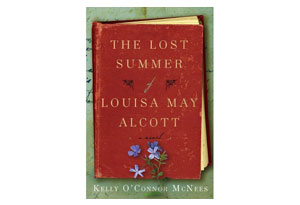Reading Questions for The Lost Summer of Louisa May Alcott
Warning: May contain spoilers

1. Have you ever read a poem or book that profoundly challenged or changed your worldview? How might the events of the novel have differed if Walt Whitman had not published Leaves of Grass in the summer of 1855?
2. What is Louisa's relationship like with each of her sisters? Do any of these relationships change throughout the novel? If so, how? Do you think Louisa's identity was defined by her sisters?
3. Abba says that men and women experience love differently: "For a man, love is just a season. For a woman it is the whole of the year." Is that true in The Lost Summer of Louisa May Alcott? Is it true in your own personal experience?
4. Bronson Alcott was a truly unusual father and man. What is your impression of him? How do you think he affected his daughters, and did he affect each one differently?
5. Describe Bronson and Abba's marriage. Do you think it influenced Louisa's view of matrimony? If so, in what way?
6. Was Louisa right not to go with Joseph Singer to New York? Why or why not? What would you have done?
7. Why was Louisa so protective of her independence? Considering the greater opportunities available to women now, but also the frenetic pace of their lives and, in some ways, more complex obligations, do you think she would be as protective of her independence if she lived today?
8. At one point Abba tells Louisa, "We must never give if we are hoping for something in return." Why does she say that? Do you think what she says is true?
9. At the end of the novel we learn that Louisa is taking care of her niece Lulu. What kind of parent do you think Louisa would be, and why?
10. Louisa tells Joseph, "My life is no longer my own." And yet she chose to base Little Women, her most successful novel, on herself and her sisters. If writers use their own experiences as inspiration, are they inviting fans to pry into their personal lives? Or should their work be taken at face value?
Read O's review
Get more reading guides
2. What is Louisa's relationship like with each of her sisters? Do any of these relationships change throughout the novel? If so, how? Do you think Louisa's identity was defined by her sisters?
3. Abba says that men and women experience love differently: "For a man, love is just a season. For a woman it is the whole of the year." Is that true in The Lost Summer of Louisa May Alcott? Is it true in your own personal experience?
4. Bronson Alcott was a truly unusual father and man. What is your impression of him? How do you think he affected his daughters, and did he affect each one differently?
5. Describe Bronson and Abba's marriage. Do you think it influenced Louisa's view of matrimony? If so, in what way?
6. Was Louisa right not to go with Joseph Singer to New York? Why or why not? What would you have done?
7. Why was Louisa so protective of her independence? Considering the greater opportunities available to women now, but also the frenetic pace of their lives and, in some ways, more complex obligations, do you think she would be as protective of her independence if she lived today?
8. At one point Abba tells Louisa, "We must never give if we are hoping for something in return." Why does she say that? Do you think what she says is true?
9. At the end of the novel we learn that Louisa is taking care of her niece Lulu. What kind of parent do you think Louisa would be, and why?
10. Louisa tells Joseph, "My life is no longer my own." And yet she chose to base Little Women, her most successful novel, on herself and her sisters. If writers use their own experiences as inspiration, are they inviting fans to pry into their personal lives? Or should their work be taken at face value?
Read O's review
Get more reading guides



